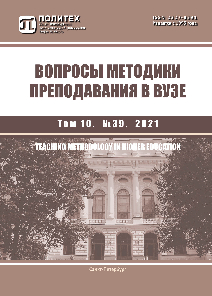TEACHING METHODOLOGY IN HIGHER EDUCATION 3(17) 2014
Year: 2014
Issue: 3(17)
Pages: 494
98
74760
Latest issues
- 2025, Volume 14 Issue 3
- 2025, Volume 14 Issue 2
- 2025, Volume 14 Issue 1
- 2024, Volume 13 Issue 4
Tutor work in academic groups
- 0
- 1191
- Pages: 178-182
Use of electronic devices in learning English
- 2
- 1258
- Pages: 223-228
Teaching learners' writing skills via Twitter
- 4
- 1295
- Pages: 255-264
Teaching speaking for specific purposes (SSP): a structured approach
- 0
- 1340
- Pages: 404-415
Compilation of tests as a method of teaching material consolidation
- 2
- 1251
- Pages: 444-446
International conference Human — computer interaction (HCII)-2014
- 6
- 1202
- Pages: 456-461
International Conference «Languages and Cultures in Modern World»
- 1
- 1395
- Pages: 462-466



